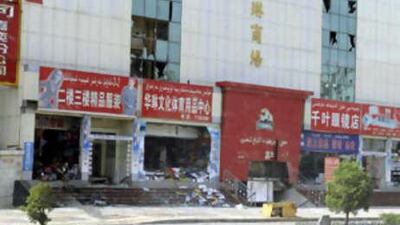Knife-wielding assailants killed three government offiials during an attack at a road checkpoint in China's troubled far-west today. Officials say the recent violence, that has coincided with the Beijing Olympics, has taken the death toll to 30. The state-run Xinhua News Agency said a group of attackers jumped from a vehicle at a road checkpoint in Yamanya town in the Muslim-dominated Xinjiang territory at about 9am and stabbed four guards, killing three. An officer at Yamanya town's police post confirmed the three deaths in the attack, though he said it occurred several hours earlier. The officer, who gave his name as Tu'ersenjiang, said the officers were local government employees who were taking down the names of people who passed through the checkpoint. They were not members of the police or military. "The case is still under investigation," Tu'ersenjiang said. A man at the public security bureau in Shule county, where Yamanya is located, said the injured officer was in critical condition at a hospital. "He has pulled away from danger," said the man, who refused to give his name because he was not authorised to speak to the media. "We are now waiting for him to wake up and speak so we can find out more details about what happened." It was the third attack on government-linked guards this month in the troubled Muslim territory, which borders Pakistan and Afghanistan and where a militant separatist group is active. On Sunday, militants tossed homemade bombs at police and other government buildings in the Xinjiang city of Kuqa, then fought with police. Twelve people died, officials said. Six days earlier, assailants rammed a truck into a group of border police then attacked them with knives and homemade bombs in Kashgar, a city near the border with Pakistan and Afghanistan. No one has claimed responsibility for the attacks, though government officials have suggested terrorism is behind the violence and insist it is not linked to the Olympics. But with three audacious attacks in just more than a week and the appearance online of videos threatening the Beijing Olympics, ethnic Uighur extremists in Xinjiang may be trying to use the games as a way to force themselves out of obscurity into the world's view. Residents and experts say the region is seething with anger among the Uighurs toward Chinese immigrants who are seen by many as symbols of government oppression. In Sunday's attack, police said 10 assailants - including a woman - were killed along with a security guard and a bystander after they hurled bombs made from pipes and gas canisters at 17 sites, and later at police. Another attacker, a 15-year-old girl, was injured, Xinhua said. County chief Yusufujiang Maimaiti today denied a female involved was 15, but refused to provide an age or confirm whether she was a juvenile. Anti-government violence has flared in Xinjiang for years. But Nicholas Bequelin, a researcher with New York-based Human Rights Watch's Asia Division, said Sunday's attacks were more highly organised. "It presents several new aspects which were not present in previous incidents in Xinjiang," Bequelin said. "One is the sophisticated coordination of the attacks: It was not just one attack. It's a string of bombings that requires much more planning and a larger organisation to carry out especially at the time of the Olympics when the security is so high." Government crackdowns often silence the Uighurs or discourage them from speaking out. Most will only speak to reporters on condition of anonymity. After the Kuqa attacks, groups of Uighurs in the city of 450,000 people strolled around the streets looking at the damage. Their Chinese neighbours appeared grim and were quick to denounce the violence. But many of the Uighurs seemed amused and cheerful. When asked if they endorsed the attacks, they wouldn't respond or said, "I don't know." That was the answer given - after a grin and a chuckle - on Monday by a merchant walking through Kuqa's market, bustling with life again after the city was shut down by security forces most of Sunday. "If you look at the streets, everything seems calm and peaceful," said the merchant, who would only identify himself as Amar because he feared retribution. "But behind it all, the situation is different. People are really angry." He accused the Chinese of restricting the study and practice of Islam. He also said Uighurs suffered job discrimination and were discouraged from using their Turkic language. Dilxat Raxit, a spokesman for the Germany-based, pro-independence World Uighur Congress, claimed in an e-mail that more than 90 Uighurs have been detained recently, and some had been tortured. Yusufujiang said "there was not an ounce of truth" to Raxit's allegations, but he would not say whether any arrests had been made. *AP

Three officers killed in China knife attack
China's official news agency says three officers have been killed in a knife attack in the Xinjaing region.
Most popular today
